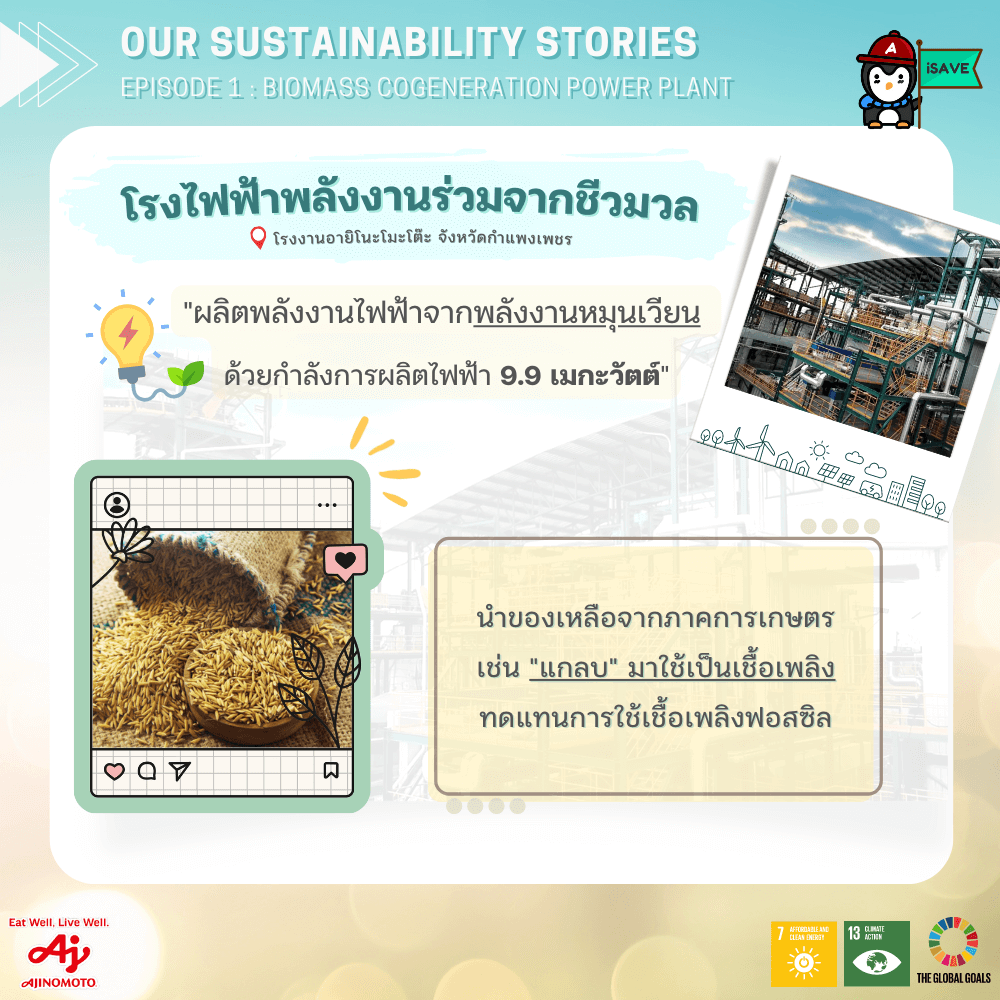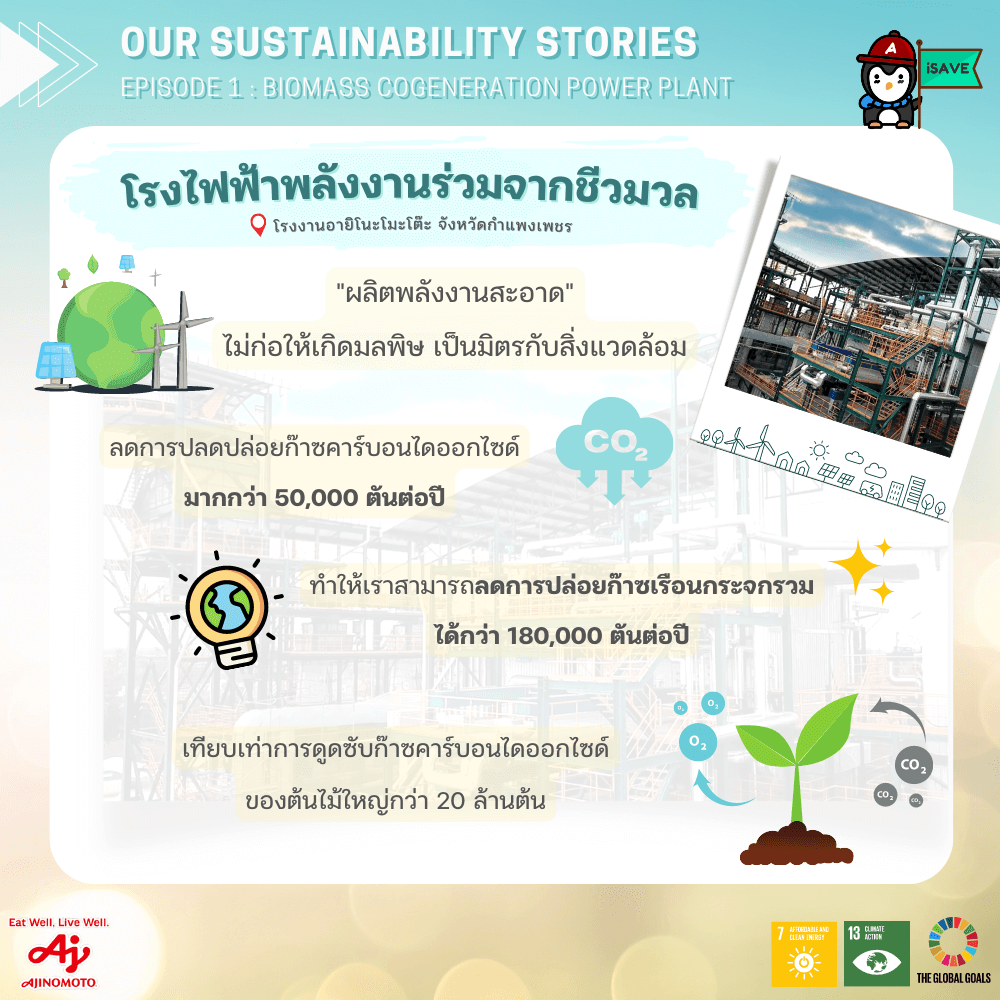โรงไฟฟ้าพลังงานความร้อนร่วมจากชีวมวล
จากข่าวพิธีเปิดอย่างเป็นทางการของ “โรงไฟฟ้าพลังงานความร้อนร่วมจากชีวมวล” ที่โรงงานอายิโนะโมะโต๊ะ จังหวัดกำแพงเพชร เมื่อวันที่ 19 กันยายน 2565 ที่ผ่านมา หลายคนคงอยากทราบว่า โรงไฟฟ้าพลังงานความร้อนร่วมจากชีวมวลคืออะไร ช่วยลดผลกระทบด้านสิ่งแวดล้อมได้จริงหรือไม่ จะช่วยให้เราก้าวไปสู่ความเป็นกลางทางคาร์บอน (Carbon Neutrality) และ บรรลุเป้าหมาย Net Zero ภายในปี 2593 ได้อย่างไร
โรงไฟฟ้าพลังงานความร้อนร่วมจากชีวมวล ที่โรงงานอายิโนะโมะโต๊ะ จังหวัดกำแพงเพชร ก่อสร้างขึ้นด้วยเงินลงทุนกว่า 1,500 ล้านบาท เพื่อผลิตพลังงานไฟฟ้าจากพลังงานหมุนเวียน ด้วยกำลังการผลิตไฟฟ้า 9.9 เมกะวัตต์ โดยนำเอาของเหลือจากภาคการเกษตร เช่น แกลบ มาใช้เป็นเชื้อเพลิงทดแทนการใช้เชื้อเพลิงฟอสซิลจึงไม่ก่อให้เกิดมลพิษ เป็นมิตรต่อสิ่งแวดล้อม อีกทั้งยังช่วยเพิ่มรายได้ และสร้างคุณภาพชีวิตที่ดีขึ้นให้เกษตรกรได้อีกด้วย


โรงไฟฟ้าพลังงานความร้อนร่วมจากชีวมวล ที่โรงงานอายิโนะโมะโต๊ะ จังหวัดกำแพงเพชร สามารถลดการปลดปล่อยก๊าซคาร์บอนไดออกไซด์เพิ่มได้อีกกว่า 50,000 ตันต่อปี ทำให้เราสามารถลดการปล่อยก๊าซเรือนกระจกรวมได้กว่า 180,000 ตันต่อปี หรือ เทียบเท่าการดูดซับก๊าซคาร์บอนไดออกไซด์ของต้นไม้ใหญ่กว่า 20 ล้านต้น นับเป็นแรงขับเคลื่อนสำคัญในการร่วมสนับสนุนการขับเคลื่อนตามวาระแห่งชาติ BCG Model ทั้งเศรษฐกิจชีวภาพ เศรษฐกิจหมุนเวียน และเศรษฐกิจสีเขียว ที่จะนำพาประเทศไทยไปสู่เป้าหมายความยั่งยืนได้ต่อไป
ทั้งนี้โรงไฟฟ้าพลังงานความร้อนร่วมจากชีวมวลยังสอดคล้องกับเป้าหมายการพัฒนาที่ยั่งยืน ข้อที่ 7 Affordable and clean energy การเข้าถึงพลังงานสะอาด โดยการเพิ่มสัดส่วนของพลังงานทดแทนในการผสมผสานการใช้พลังงานของโลก ภายในปี 2573 (7.2) และ ข้อที่ 13 Climate Action การรับมือการเปลี่ยนแปลงสภาพภูมิอากาศ โดยการหันมาใช้พลังงานสะอาด เพื่อลดปัญหาการเปลี่ยนแปลงสภาพภูมิอากาศ การปรับตัว การลดผลกระทบ และการเตือนภัยล่วงหน้า (13.3) อีกด้วย
ข่าวอื่น ๆ

อายิโนะโมะโต๊ะ ยกระดับแคมเปญ ‘กินอร่อย ใจก็ดีขึ้น’ ปีที่ 2 เนรมิตพื้นที่ Comfort Eating ฮีลใจ กลางสยามสแควร์ ในงาน “Eating is a Miracle Self-Love Food Fest”

อายิโนะโมะโต๊ะ จับเทรนด์วิ่งมาแรงในไทย จัดงาน “aminoVITAL Run 2026” พร้อมเปิดตัว
อะมิโนไวทัล ฟิทท์ เคลียร์เวย์ โปรตีน สำหรับคนออกกำลังกาย

อายิโนะโมะโต๊ะ ผนึกกำลัง SCGP เดินหน้าพัฒนาระบบอัตโนมัติ ขับเคลื่อนบรรจุภัณฑ์รักษ์โลกสู่ความยั่งยืน